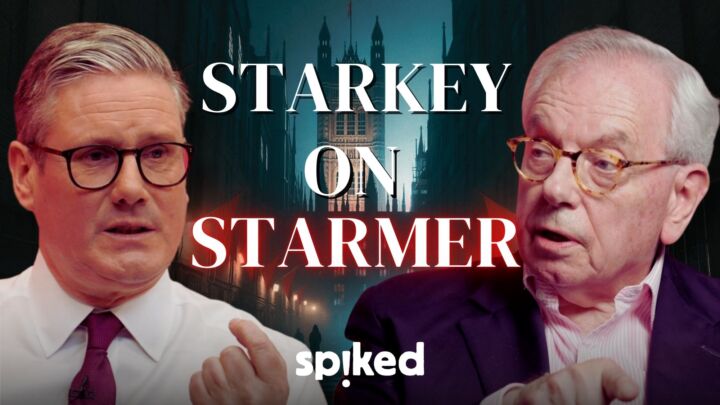Will Nigel Farage land another blow against the establishment?
Love him or loathe him, the Reform UK leader has banished the boredom from this election.

Want to read spiked ad-free? Become a spiked supporter.
What a difference 10 days makes. A little more than a week ago, Nigel Farage was enduring some well-earned ribbing on social media for announcing that he’d play a relatively minor part in the UK’s 4 July General Election. As ‘honorary president’ of Reform, successor to the Brexit Party, Farage said he’d ‘do [his] bit’ in the campaign, but ‘important though the General Election is’, he had his eyes firmly fixed on helping Donald Trump stage another hostile takeover of the White House in November’s US presidential election. It was an awkward position for a self-dubbed patriotic populist to take.
Now, after going out on the campaign trail, posing for selfies in pubs and enraging the Twitterati with his umpteenth appearance on Question Time, Farage is back where he has been in so many elections over the past few decades: leading the populist challenger to the right of the Tory Party. Today, Farage announced he is once again leader of Reform – replacing Richard Tice, who will become party chairman – and he will be contesting another Westminster seat, Clacton, hoping this will prove to be his eighth time lucky. Whatever else happens, it won’t be boring.
Indeed, his press conference today in south-east London was a reminder of what, up to now, this election has lacked. Namely, a pulse. Love Farage or loathe him, his populist ear and message clarity makes Keir Starmer, Rishi Sunak and – if we’re being completely honest – even his own predecessor look terminally low-energy by contrast. (Just before Farage took the stage, Tice broke into a strange riff about how he himself has been livening up the election thus far: ‘I’ve been talking about barbers, others have been talking about hairdressers, it’s getting people going, why not?’)
Farage’s punchy, freewheeling speech was essentially a laundry list of issues on which the Tories are on the wrong side of their own voters and Labour doesn’t have any coherent answer – from record mass immigration, introduced in the face of growing public scepticism, to the growing dysfunction of almost every service, public and private, ordinary people might have the misfortune to come into contact with. ‘Nothing works’ in Britain anymore, he said, declaring his intention to ‘lead a political revolt’ against a failed elite consensus. He’ll be launching his constituency campaign in Clacton, on the Essex coast, tomorrow. ‘They have a very good Wetherspoons there’, he reassured the press pack.
Can he win it? Recent history suggests we shouldn’t count him out. The Tendring district in which Clacton sits voted Leave by 70 per cent in the EU referendum. The seat was once held by Douglas Carswell, who defected from the Conservatives to UKIP in 2014, when Farage led the party. It was the only seat UKIP retained at the 2015 election, despite winning four million votes nationally, thanks to the undemocratic quirks of our first-past-the-post electoral system (something Farage also took aim at, alongside a ‘corrupt’ House of Lords, in today’s presser). A Survation poll of Clacton voters, conducted in January, suggested Farage could win it comfortably, beating the Tory incumbent by 10 points.
Then there’s the question of what Farage throwing his flat-cap into the ring will mean for the race in general. His view, which he’s expressed time and again in recent days, is this: Keir Starmer is going to win anyway, the Conservatives are imploding without his help and the question now is about what kind of right will emerge from Sunak’s smouldering Sambas. While many have compared this election to 1997, when Tony Blair’s New Labour laid waste to John Major’s Conservatives, some sages on the right have been reaching for another, even more dramatic precedent: 1993, in Canada, when the Progressive Conservatives went from 169 seats to just two, in large part thanks to a challenger party to its right, also called Reform. The two parties merged a decade later, to form the Conservative Party of Canada, which is currently threatening to turf out Justin Trudeau. Farage seems keen on the parallel, claiming he rebranded the Brexit Party as Reform UK for precisely this reason.
If Reform’s plan is to destroy the Tories – a goal vanishingly few people in the nation would now begrudge – Farage’s entrance will help no end. A YouGov MRP ‘mega poll’ of 50,000 voters, published this evening, suggests the Conservatives could well be facing an ‘extinction-level’ event, reduced to 140 MPs, their worst-ever election result. And that was conducted before Farage announced his intention to stand. Even if Reform fails to win any seats, it is widely expected to fuel Conservative losses. Indeed, much of Sunak’s strategy so far – from calling the election so suddenly to offering a ‘quadruple lock’ on pensions to reintroducing ‘national service’, even though it isn’t actually national service – makes a lot more sense when you realise his primary aim has been to wrongfoot Farage and Co, stem electoral losses to his right and prevent any more Tory-Reform MP defections. Now, it seems, even that low-ambition strategy isn’t working out as planned.
Reform, even with Farage back at the helm, still has its problems. Its funding pales in comparison to that of the main parties. It’s also, strangely for a party that likes to claim the mantle of people power, not actually a political party in the democratic, bottom-up sense. You can register as a supporter, not a member. It’s run, explicitly, like a limited company. Then there’s Farage’s instinctual Thatcherism which, were it ever exorcised, would stand Reform in even better stead with voters in Labour’s former heartlands – areas where UKIP and the Brexit Party have otherwise, previously, done well.
Farage certainly has lofty ambitions. He says his aim is to surpass UKIP’s 2015 vote share and redraw the political map. Whether his party can connect with voters on that scale, or whether it will be hobbled by its own political, professional and structural limitations remains to be seen. But one thing is clear: there is fertile ground for a populist message to take hold in an election in which the concerns of ordinary people have up to now been banished from the discussion, by two main parties who are firmly back under technocratic management. Just look at Farage’s new stomping ground of Clacton: a seaside town just two hours’ drive from London, in the heart of the supposedly prosperous south-east, which ranks in the top one per cent of the most deprived areas in the nation; a blue-collar area which backed Brexit hoping to upend the status quo, only to have standard political service resume a few short years later.
You do not have to be a paid-up Reform booster – we at spiked aren’t – to see why Nigel Farage is still in with a fighting chance, all these years on. If anything, it’s unfortunate that the prospects for a populist politics in Britain now rest not just on one right-wing party, but basically on a single politician. If / when Labour wins this election, it will do so because of widespread demoralisation with the Tories, not because Britain’s long-forgotten working classes have retaken their traditional political home. The left long ago disappeared down the rabbit hole of sectional identity politics and obsessive Israelophobia – causes which leave working-class people bemused, at best. The Conservative Party – which, with Brexit, was given a golden opportunity to carve out a new cross-class base – has reverted back to bloodless, Cameroon type.
Will Nigel Farage land another stinging blow against the establishment? We’ll find out in four weeks’ time. But beyond this election, those interested in a populist, democratic politics, truly capable of reshaping Britain in the interests of ordinary people, need to start doing more than holding out for one right-wing hero.
Tom Slater is editor of spiked. Follow him on X: @Tom_Slater_
Picture by: Getty.
To enquire about republishing spiked’s content, a right to reply or to request a correction, please contact the managing editor, Viv Regan.









Comments
Want to join the conversation?
Only spiked supporters and patrons, who donate regularly to us, can comment on our articles.